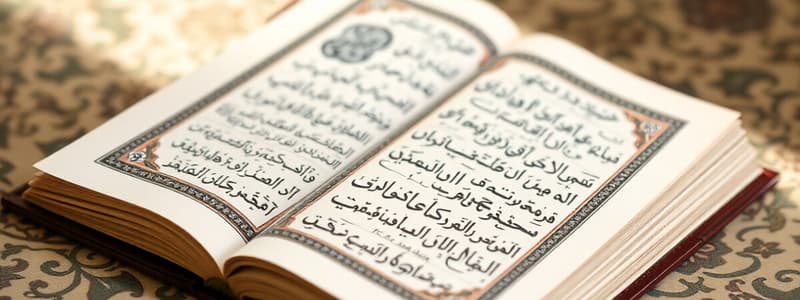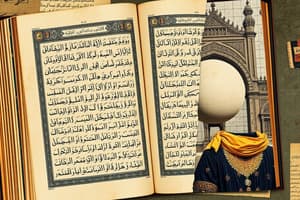Podcast
Questions and Answers
What is the primary belief about these scriptures regarding their origin?
What is the primary belief about these scriptures regarding their origin?
- They are meant to be interpreted solely for academic study.
- They are considered to be inspired or revealed by Almighty God. (correct)
- They are purely philosophical texts with no religious affiliation.
- They are created by human authors without divine influence.
Which of the following statements best encapsulates the purpose of these scriptures?
Which of the following statements best encapsulates the purpose of these scriptures?
- To uphold legal frameworks and social norms.
- To provide guidance for the human race. (correct)
- To serve as historical documents for society.
- To promote scientific reasoning and inquiry.
How are these scriptures generally perceived in terms of their authority?
How are these scriptures generally perceived in terms of their authority?
- They are seen as guidelines subject to personal interpretation.
- They are acknowledged as sacred and authoritative texts. (correct)
- They are viewed simply as a collection of moral stories.
- They are regarded as outdated and irrelevant.
What characteristic of the scriptures contributes to their revered status?
What characteristic of the scriptures contributes to their revered status?
What does the idea of being 'sacred' imply about these scriptures?
What does the idea of being 'sacred' imply about these scriptures?
What was the primary purpose of sending a scholar with every Mushaf?
What was the primary purpose of sending a scholar with every Mushaf?
Which aspect was emphasized as necessary for proper recitation of the Mushaf?
Which aspect was emphasized as necessary for proper recitation of the Mushaf?
What does the content suggest is insufficient for proper recitation of the Mushaf?
What does the content suggest is insufficient for proper recitation of the Mushaf?
How is the transmission of knowledge related to the efficacy of recitation mentioned in the content?
How is the transmission of knowledge related to the efficacy of recitation mentioned in the content?
According to the information, what is fundamental to the methodology of reciting the Mushaf correctly?
According to the information, what is fundamental to the methodology of reciting the Mushaf correctly?
Study Notes
Inspiration and Transmission of the Quran
- The majority of Islamic scriptures are considered divinely inspired or revealed by God.
- These scriptures are sacred and viewed as a guide for humanity.
- Scholars were sent with copies of the Quran to ensure proper recitation.
- Proper recitation relied on learning through direct contact with teachers who had a transmission chain back to the Prophet Muhammad.
- This transmission was not simply about script or spelling conventions.
Content and Structure of the Quran
- The Quran is divided into 114 chapters (suras) of varying length and content.
- Each sura contains different admonitions or messages.
- God provided the Prophet Muhammad with answers to questions and challenges.
Recitation and Translation of the Quran
- It is only permissible to recite the Quran in Arabic during prayer.
- Translators of the Quran must be Muslim.
Studying That Suits You
Use AI to generate personalized quizzes and flashcards to suit your learning preferences.
Related Documents
Description
Explore the divine inspiration and transmission of the Quran, including its structure and the importance of proper recitation. This quiz delves into the sacred text's chapters, messages, and guidelines regarding translation. Test your knowledge on this essential aspect of Islamic teachings.




